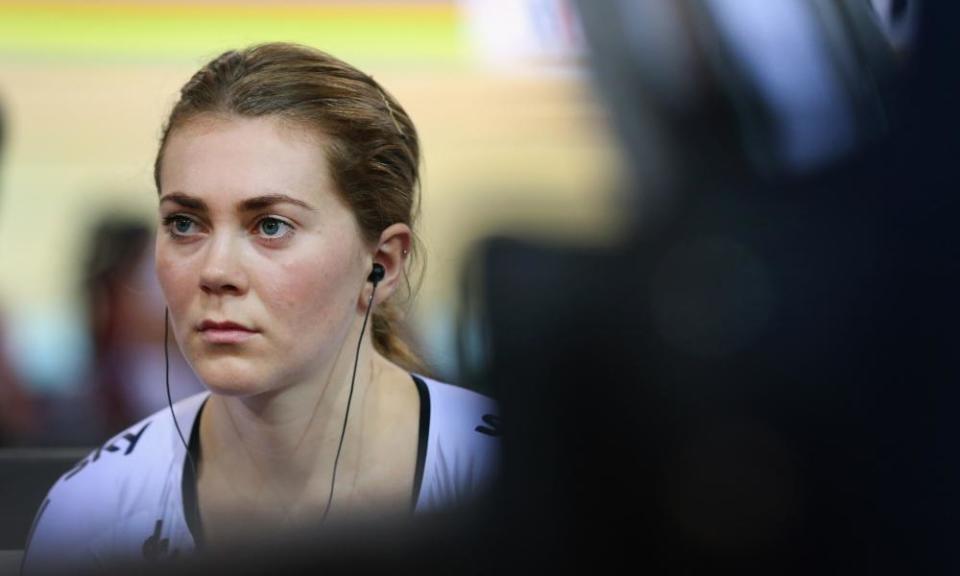British Cycling coaches 'jealous' of athletes' success, says BMX champion

BMX world champion Liam Phillips has claimed that British Cycling denied athletes a chance to capitalise on their success via sponsorship deals at an employment tribunal for his girlfriend, the Olympic cyclist Jess Varnish.
Varnish has accused British Cycling of exercising “extreme control” over her and other athletes in her long-running legal attempt to sue the organisation for sex discrimination and unfair dismissal.
In order to bring her discrimination claim, Varnish, 28, must first prove that she was an employee of either British Cycling, which didn’t pay her but had supported her training since she was 12, or UK Sport, which from 2015 provided her with a £21,500 tax-free grant towards her living and training costs.
She fell out publicly with British Cycling in the run-up to the 2016 Olympics in Rio, when she was kicked off the podium programme for top athletes. She had failed to qualify for her sprint event at the Olympics and her coaches decided that she was unlikely to win a medal at Rio.
On Wednesday Phillips, who has been dating Varnish since 2012, said the “success of British Cycling had come at a huge cost to the athletes”. He spoke of a big shift in 2008 after the “phenomenally successful” Beijing Olympics, when the “money started rolling in” for British Cycling, with coaches beginning to earn more than they ever had before.
This, Phillips said, resulted in a culture of jealousy between coaches and the athletes over their earnings. “Money distorted everything and it was divisive,” he said. “The coaches became very aware of what each other were earning. They would see athletes’ earning opportunities and would get a bit jealous.”
Phillips, like Varnish, also spoke of the control British Cycling exerted over almost every aspect of the athletes’ lives, including where they trained during Christmas holidays, social events they could attend and sponsorship deals they were allowed to sign.
In a list of examples that Phillips gave regarding the institution’s apparent controlling nature, he cited an incident where double Olympic gold medal winner Philip Hindes was invited to the royal box at Wimbledon.
“The invitation was sent to the velodrome and the coaches opened it and threw it away, because they decided it would interfere with his training,” he said.

Hindes was allegedly furious when he discovered this and confronted the coaches, who told him if he attended the event he would put his selection for the under-23 UEC European Championships in jeopardy. During the tribunal it was revealed that Hindes would go on to defy his coaches and attend Wimbledon.
In another example, Phillips said he was was offered £12,000 in 2014 to take part in a campaign with Bacardi, but when his agent approached British Cycling his appearance was blocked.
However, British Cycling’s barrister, Thomas Linden QC, suggested that this request was refused by the organisation as it would have been inappropriate for a young athlete to appear to be promoting an alcoholic brand.
Phillips went on to claim that athletes had “severely restricted earning opportunities” and that they gained little financial reward from British Cycling’s sponsorship deals.
Olympic gold winner Jason Kenny allegedly told Phillips that his skin suit was covered in logos and that he was a “walking, talking billboard, but he’s seeing none of it”.
Phillips went on to say: “It is run more like a business whose aim is to make profit by being successful on the track. It is no longer a purely sporting organisation. As the business model has developed the independence of the cyclists has been eroded until now they are very much cogs in the system, fully integrated, fully branded and ultimately controlled by British Cycling.”
The employment tribunal in Manchester was also due to hear from former British Cycling and Team Sky doctor Richard Freeman. However, he was unable to attend due to an ongoing investigation by the General Medical Council.
It is understood Dr Freeman was going to support Varnish’s claim that British Cycling exerted high levels of control over her life while part of the Olympic team and his written statement is part of her submission to the tribunal.
But for that statement to carry any weight in Judge Ross’s deliberations on this potentially landmark case for British athletes’ employment status, Freeman would have had to make himself available for cross-examination.
Freeman was involved in cycling’s jiffy-bag scandal and was due to be a key witness speaking in support of Varnish in the tribunal. He is due to appear at a GMC hearing in February to explain how a mysterious package of testosterone arrived at Team Sky’s headquarters in 2011.
He denied any wrongdoing over the package, which was delivered to Sir Bradley Wiggins after a race in 2011, despite allegations of the misuse of an anti-inflammatory drug.
Varnish’s other supporting witness, her agent James Harper, who also represents Phillips and several other athletes, claimed that British Cycling is “the most aggressive” governing body he works with in terms of controlling the commercial rights of its athletes. To support this claim, he listed the difficulties he had while trying to do personal deals for Varnish and Shanaze Reade, the multiple BMX and track world champion.
He also discussed Ben Swift’s contentious move from Katusha to Team Sky in 2010. “Other sports are much better developed in protecting their athletes,” wrote Harper. “The level of control exercised by British Cycling is enormous.”
Linden, however, described Harper’s testimony as nonsense and tried to demonstrate that Harper was building a case to impress the media without explaining, or even understanding, contract law.
Varnish is trying to persuade the tribunal that she, and other funded athletes, are employees, so she can sue British Cycling for wrongful dismissal and sex discrimination when they dropped her from the programme in March 2016.
The tribunal continues.

 Yahoo Sport
Yahoo Sport 





































